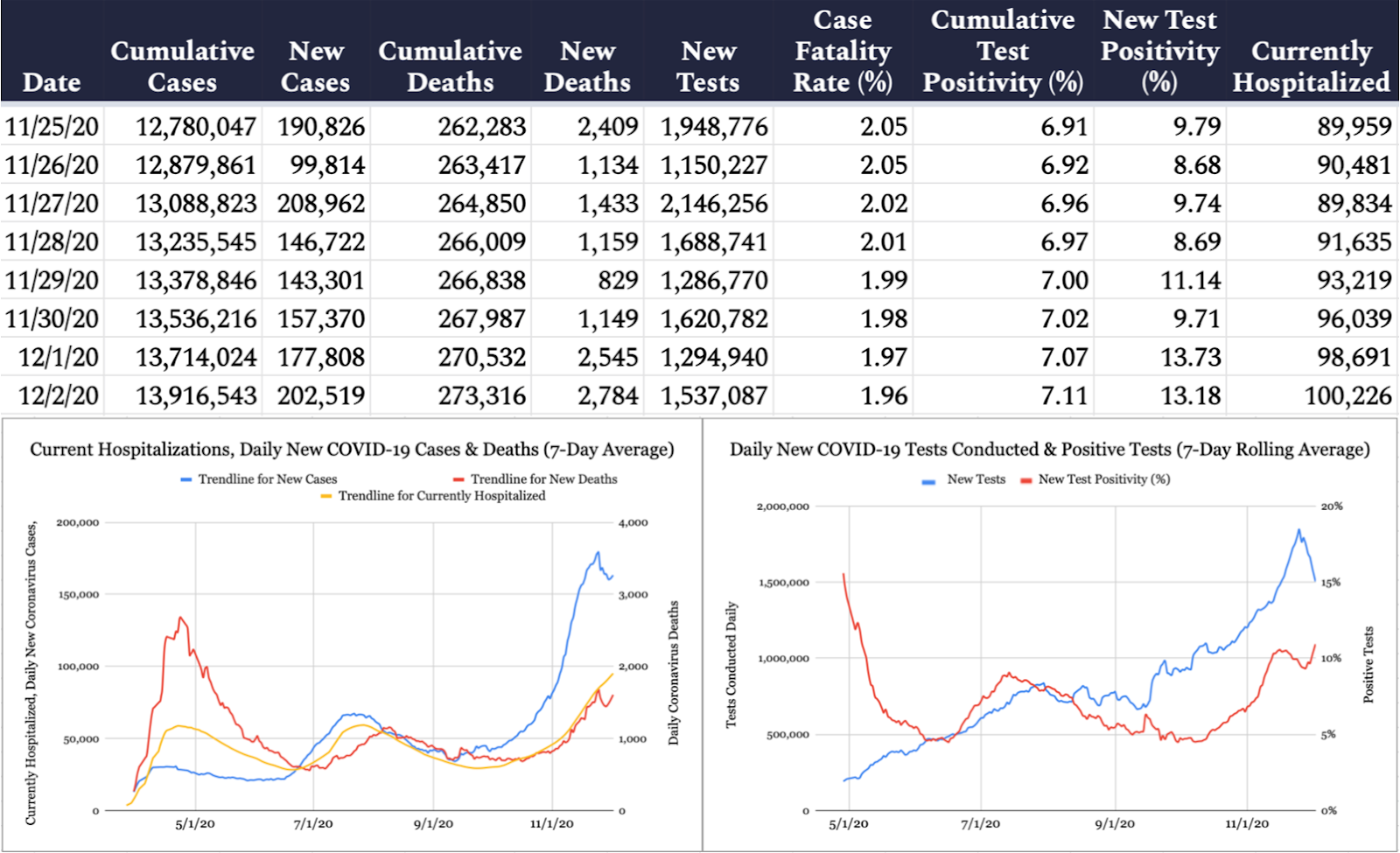Happy Thursday! A decorated general and former national security adviser—whom President Trump just pardoned—advocated this week for “temporarily suspend[ing] the Constitution and civilian control of these federal elections in order to have the military implement a national re-vote that reflects the true will of the people.” But that’s more of a dog-bites-man story nowadays, isn’t it?
Quick Hits: Today’s Top Stories
-
The Centers for Disease Control and Prevention issued a series of updated guidances on Wednesday regarding the coronavirus, encouraging Americans to avoid holiday travel entirely or at least get a COVID test before their trip. The CDC also shortened the recommended quarantine period following exposure to the virus from 14 days to between seven and 10 days, depending on symptoms and test results.
-
Mark Kelly, a former astronaut from Arizona, became the first senator-elect from this cycle to be sworn in, securing the Democrats an additional seat in the chamber. Kelly took the oath of office earlier than other senators-elect because his victory over Republican Sen. Martha McSally came in a special election.
-
House Speaker Nancy Pelosi and Senate Minority Leader Chuck Schumer said on Wednesday they’d like to use the bipartisan $908 billion stimulus framework rolled out yesterday as the basis for renewed aid talks, a complete shift from their longtime demands for a $2 trillion-plus package. There’s still a long way to go in hammering out a deal, but it’s a big step on the part of Democratic leaders toward considering legislation that could actually pass.
-
President-elect Joe Biden said he would not immediately remove President Donald Trump’s sweeping tariffs on Chinese exports to the United States when he takes office, telling the New York Times he wants to conduct a review of the matter “so we can develop a coherent strategy.”
-
The United States confirmed 202,519 new cases of COVID-19 yesterday per the Johns Hopkins University COVID-19 Dashboard, with 13.2 percent of the 1,537,087 tests reported coming back positive. An additional 2,784 deaths were attributed to the virus on Wednesday, bringing the pandemic’s American death toll to 273,316. According to the COVID Tracking Project, 100,226 Americans are currently hospitalized with COVID-19.

UK Authorizes Pfizer/BioNTech COVID-19 Vaccine
The United Kingdom on Wednesday became the first Western country to authorize a COVID-19 vaccine, granting an emergency use authorization for American pharmaceutical company Pfizer and its German partner BioNTech’s two-shot drug. Approximately 800,000 doses of the vaccine—enough to inoculate 400,000 people—will be shipped to the UK in the coming days.
How did the UK jump ahead of both the European Union and United States in approval? The EU in October granted Britain’s Medicines and Healthcare Products Regulatory Agency (MHRA) authorization to break away from the EU for drug approval before December 31—the end of the Brexit transition period—in the event of a public health emergency. Part of the UK’s speediness can also be attributed to the MHRA’s rolling review process, whereby federal officials monitor trial data as they arrive rather than all at once.
George Rutherford, an professor of epidemiology at the University of California-San Francisco, says Britain’s expedited review process is not cause for concern. “They just pulled it together faster,” he said. “I can’t imagine that the [MHRA’s] review is anything less than what the FDA review and approval is. It just got scheduled a week earlier.”
The president and his allies have expressed frustration in recent weeks about the Food and Drug Administration’s (FDA’s) approval process, particularly because Operation Warp Speed has in many ways become the crown jewel of Trump’s presidency. White House officials reportedly summoned FDA Commissioner Stephen Hahn to the West Wing earlier this week for an explanation as to why the U.S. still has not granted emergency use authorization to Pfizer, which applied for FDA approval late last month.
“We are one of the few regulatory agencies in the world, if not the only one, that actually looks at the raw data from clinical trials,” Hahn told CBS News on Wednesday. “So we’re not going to take a summary from a company and take their conclusions and base our decision on that.”
Even though the United States lags slightly behind the UK in giving Pfizer the stamp of approval for widespread distribution, the pace at which these vaccines are barreling through the FDA’s regulatory hoops is still unprecedented. Without emergency use authorization, the COVID-19 vaccine would have taken years to reach the market.
The FDA’s Vaccines and Related Biological Products Advisory Committee will convene on December 10 to review the Pfizer/BioNTech vaccine and December 17 to review the Moderna vaccine. “The FDA staff will have pored over these data, and the manufacturers will have pored over the data, and will present what the efficacy is and what the risks are,” Rutherford, the epidemiology professor, said of the expected approval process.
If and when these vaccines are approved, who will be first in line to receive them? On Wednesday, the Center for Disease Control and Prevention’s Advisory Committee for Immunization Practices (ACIP) unveiled its COVID-19 vaccine prioritization recommendations, voting 13-1 in favor of giving healthcare workers (about 20.5 million in the country) and residents of long-term care facilities (just under 2 million) first dibs. CDC Director Robert Redfield adopted ACIP’s recommendations following the vote, but the agency’s guidelines remain only recommendations, as governors will have the final say in their respective states. Gov. Doug Ducey, for example, made clear yesterday that teachers will be a priority for early inoculation in Arizona.
As we noted last week, Pfizer said it expects to have 50 million doses (enough for 25 million people) available globally by the end of 2020. Moderna said it will be able to produce 20 million doses for the United States over the same time horizon. There thus likely won’t be enough supply for the general public until early spring. “At that point we are very likely to have at least two and maybe three and maybe more different vaccines available,” Dr. William Schaffner, an infectious disease specialist at the Vanderbilt University Medical Center, told The Dispatch last week.
Still, herd immunity will depend on Americans’ willingness to receive the vaccine. “There’s a lot of skepticism out there which I hope will wear off over time as more and more of everybody’s neighbors get vaccinated and we can begin to see what the impact of vaccination is on the occurrence of disease,” Schaffner said. Former presidents Barack Obama, George W. Bush, and Bill Clinton have all volunteered to receive the vaccine on camera to bolster confidence in its efficacy.
Georgia Republicans Are Doing the Democrats’ Jobs for Them
This weekend, President Trump will head to Georgia to rally on behalf of Republican Sens. Kelly Loeffler and David Perdue, whose January runoffs against challengers Jon Ossoff and Raphael Warnock will determine which party controls the Senate during the first two years of the Biden administration. In a race that will be decided based on which party can better sustain election-day levels of enthusiasm until January, the senators hope Trump’s presence will bring a welcome shot of adrenaline to their campaigns. But the visit also threatens to aggravate the bizarre intra-party feud that has sprung up in the Georgia GOP over the president’s baseless allegations that the presidential election was stolen from him.
Other than Arizona, Georgia was the only swing state Biden won this year that has a Republican-controlled state government. Once it became clear that the former vice president would carry the state, a tidal wave of grassroots fury started to build among Georgia Trump supporters against the state officials who had failed to stop the supposed election theft: Governor Brian Kemp and Secretary of State Brad Raffensperger. As Raffensperger has continued to defend the integrity of the election and Kemp has taken procedural steps to certify its results, that anger has only continued to grow.
Perdue and Loeffler—and their national Republican allies—have been desperate to ensure that this infighting does not imperil their chances of carrying the state in the runoffs. Unsurprisingly, that’s meant putting significant distance between themselves and Kemp and particularly Raffensperger, whose resignation they publicly called for last month.
But since then, the senators have tried to keep the election conversation focused, not on claims of fraud, but on the importance of the runoffs to holding the Senate. When crowds have chanted for them to “stop the steal,” for instance, Perdue has offered only a cagey promise to “hold the line.”
Trump, of course, likes talking about nothing better these days than the supposed election fraud perpetrated against him and the Republicans who betrayed him along the way. Over the past few days, he has repeatedly gone after Raffensperger and Kemp, whom he has called “the hapless governor of Georgia.”
Despite this obvious enthusiasm gap, Trump has so far declined to lump Loeffler and Perdue in with the sinners, arguing instead that Republicans should turn out for them whether they get the presidential result they want or not.
That’s a message at odds with one being pushed by other Trumpworld figures in the state, who have been arguing that Republicans should withhold their support from their senators unless they make an explicit effort to help Trump maintain power. Lin Wood, a prominent Georgia lawyer who has been making public appearances alongside Sidney Powell, told a rally crowd on Wednesday that Loeffler and Perdue “have not earned your vote. Don’t you give it to them. Why would you go back and vote in another rigged election?”
After several days of this sort of thing, the Trump campaign itself began firing back against Wood Wednesday night, circulating a Breitbart piece accusing him of voting for and donating to Democrats throughout his career (something that Trump himself has also done).
For their part, Georgia Democrats have watched all this taking place with bemusement and perhaps a bit of schadenfreude. Really American PAC, a Democratic outside group with an apparent taste for mayhem, has been putting up billboards aimed at suppressing the Republican vote in the state: “Perdue/Loeffler didn’t deliver for Trump. DON’T deliver for them.”
But where Democrats really hope the Republican civil war hurts the GOP incumbents is in the middle—among some of the split-ticket voters who helped put Biden over the top in the state in November while still supporting a Republican Senate slate.
“The Republican civil war—it’s just mind-boggling, but it’s not something that we can really control or hone in on,” a source with the Ossoff campaign told The Dispatch. “You have Republicans who are still living in the past of November 3, and not trusting what happened, and that’s going to have a depressive effect on Republican voters. But not only are they depressing their own base, but David Perdue also made a decision to peddle these conspiracy theories that aren’t going to endear him to the moderate Georgian voter who went and voted for Joe Biden.”
Trump’s Twitter Feed Comes to Life
In the weeks since losing the election, President Trump has kept a lower profile than perhaps at any other point in his presidency. Since November 3, he has routinely had no official events on his schedule and gone days without taking questions from reporters. This is highly irregular: the Washington Post reported a few weeks ago, citing data from Factbase, that Trump spoke a cumulative 8,143 public words total between November 3 and November 22; looking at 2020 on the whole, he has averaged 8,398 per day.
So the 46-minute, pre-recorded speech he uploaded directly to Facebook yesterday afternoon represented a break from his recent norm, at least in form. In content, the address was entirely consistent with the president’s online posts that get flagged as misinformation day after day after day.
He billed it as “the most important speech [he’s] ever made,” and if that’s true, it’s quite an indictment of his past four years in office. Trump complained, with charts, about votes “miraculously” showing up overnight (translation: being counted), and rehashed many of the same Dominion Voting Systems conspiracies that have been debunked over and over and over and over again. He said it was “statistically impossible” for him to have lost, and, in a moment of questionable self-awareness, decried how “desperate” the Democrats have been.
The president’s remarks came one day after his own attorney general said the Justice Department has, to date, “not seen fraud on a scale that could have effected a different outcome in the election,” and one day after a local elections official in Georgia pleaded with him to cut the conspiracy theorizing for fear of someone getting hurt or killed. Every battleground state that Trump would need to flip has certified its results for Biden, and the president’s legal team has one win and 40 losses in post-election litigation.
Trump said yesterday he is “prepared to accept any accurate election result,” but almost a month after an accurate election result became apparent, that is clearly not the case. Trump decided long before November 3 that any race he didn’t win would be illegitimate.
But him thinking that doesn’t make it so. The electors will meet on December 14 to cast their votes for president and vice president, and Congress will count those votes on January 6, two weeks before Joe Biden is sworn in as president. If yesterday was any indication, none of these developments will stop the baseless rhetoric from Trump. But we’ll leave that to Alec and Khaya over at the Dispatch Fact Check and continue to focus on reality here in TMD.
Worth Your Time
-
Even as President Donald Trump’s legal team continues its efforts to overturn the results of the election, Elaina Plott reports for the New York Times, some Americans “find themselves increasingly comfortable tuning out, moving on and looking forward to January.” She spoke with a number of Biden supporters from Pennsylvania, writing that many of them have started viewing Trump’s claims about the election “as more of a nuisance with a sell-by date than a lasting danger to democracy.” These voters said they are more concerned with skyrocketing coronavirus cases right now than Trump’s rhetoric. “People are more willing to tune out the theater now,” Doylestown local Anthony Palazzolo, 30, told Plott. “I’ve noticed it in small things, like people are less on their phones and interacting more on the sidewalks. People are seeing the light at the end of the tunnel.”
-
Remote schooling during the pandemic has left a lot of students behind—many don’t have Internet access or the technology needed to keep up with their schoolwork. Students also face distractions and challenges inherent in staying at home, especially if they have siblings and other relatives there with them all day. The Washington Post reports that seven families are suing the state of California over the matter, arguing the government has failed to extend “basic educational equality” to Black and Latino students and students from low-income households. The lawsuit details problems students have had with the transition to remote learning, “including sporadic instruction and a lack of access to laptops or reliable Internet.” The complaint says the situation has left many students “functionally unable to attend school.”
Presented Without Comment
Also Presented Without Comment
Toeing the Company Line
-
On this week’s Dispatch Podcast, the gang breaks down what to make of the latest moves by Attorney General Bill Barr—appointing U.S. Attorney John Durham as a special counsel and disputing President Trump’s claims of widespread election fraud—before turning to COVID-19 vaccine prioritization and last week’s killing of Iranian nuclear scientist Mohsen Fakhrizadeh.
-
In his latest G-File (🔒), Jonah writes that American political culture, despite all of its lofty ideals, doesn’t always live up to its “fastidiously principled and moralistic” standard. Our deeply hypocritical political figures are revelatory of that deficiency, and not in a bad way. “The value of hypocrisy in the political realm is that it helps us identify when the mask slips and we get to see the baser motivations behind supposedly noble motives.”
Let Us Know
With December now well underway, even the scroogiest Morning Dispatchers are at last authorizing their households to launch into seasonal jollity (Haley, by contrast, has been hitting the Christmas tunes since early October). Do you have a holiday movie (or several!) that you make sure to rewatch every year?
Reporting by Declan Garvey (@declanpgarvey), Andrew Egger (@EggerDC), Haley Byrd Wilt (@byrdinator), Audrey Fahlberg (@FahlOutBerg), Charlotte Lawson (@charlotteUVA), and Steve Hayes (@stephenfhayes).
Photo by Tayfun Coskun/Anadolu Agency via Getty Images.







Please note that we at The Dispatch hold ourselves, our work, and our commenters to a higher standard than other places on the internet. We welcome comments that foster genuine debate or discussion—including comments critical of us or our work—but responses that include ad hominem attacks on fellow Dispatch members or are intended to stoke fear and anger may be moderated.
With your membership, you only have the ability to comment on The Morning Dispatch articles. Consider upgrading to join the conversation everywhere.